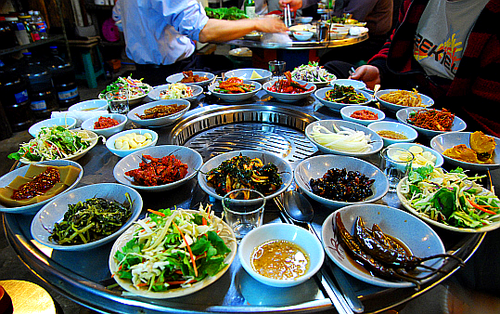With the diet and health food industries booming, many Americans are confused about what a “healthy” diet is. Chinese medicine nutrition offers a different perspective and some time-tested ideas about how to improve your health through diet.
Qi

In Chinese medicine, “Qi” (pronounced “chee”) is the vital energy that pervades all living things. When a person’s Qi is depleted or unbalanced, illness or fatigue result. One of the best ways to support strong and balanced Qi is maintain a balanced and healthy lifestyle and eating habits.
The Importance of Diet
Since our Qi is built primarily from the foods we eat, and since we must eat to live, dietary therapy is one of the most effective ways to improve health. Simple changes and considerations in diet, including eating regular, relaxed, and balanced meals can have enormous health benefits.
Fresh and Whole Foods Provide More Vital Energy
When choosing foods, a general rule is that the longer the shelf life of a food, the less Qi it contains. Fresh, whole and unrefined foods grown with a minimum of chemicals and additives are best. Refined foods such as sugar, flour and canned, frozen or packaged foods are stripped of many of their nutrients through processing. A diet based on the freshest fruits, vegetables, and proteins is ideal and organic and at least ‘hormone and antibiotic-free’ is important when choosing meat and dairy products, since hormones and chemicals become concentrated in the fat portions of these foods. Here in Boulder, Colorado our sources for healthy foods are plentiful. To find sources for natural food near you, see www.eatwild.com and www.eatwellguide.com.
Support for Digestion & Energy
While eating well will support your body overall, maintaining healthy digestion is the key to gaining maximum energy and nutrition from the foods you eat. Some guidelines for supporting and maintaining healthy digestion are:
- Eat cooked foods rather than raw or cold foods. Soups, stews and congees are especially beneficial for those with poor digestion. Chinese medicine nutrition states that too many raw or cold foods or drinks can weaken digestion.
- Chew every bite well. Eating mindfully also makes the process of eating more enjoyable, and helps your body extract maximum nutrition from the food you eat. Eating mindfully also helps prevent overeating, which can lead to stagnation in the body.
- Do eat breakfast, and don’t skip meals. Eating regular meals will help prevent ‘crashing’ and also avoid the stress that snacking and irregular mealtimes can place on your digestive system. Intermittent fasting can be beneficial, but research shows the greatest benefits are obtained when healthy food is consumed earlier in the day, and on a regular routine.
- Make breakfast and lunch your largest meals. A lighter dinner is optimal for digestion, and don’t put solid food into your stomach for at least one hour before going to bed. This will provide the fuel you need to get through the day, and allow your digestion time to rest at night.
- Decrease or avoid foods with intense flavors and energetic properties such as alcohol, coffee, refined sugar, soda, excess salt, excess dairy, fatty or fried foods, and cold and raw foods and drinks. These foods can be used therapeutically in small amounts, but otherwise are believed to impede digestion.
- Include foods that enhance the flora in your digestive tract Probiotic foods such as kefir, miso, yogurt, kimchi and sauerkraut can support your microbiome, and foods with polyphenols and prebiotic fiber such as greens, whole grains, and pretty much all fresh fruits and vegetables help support a diverse and healthy microbiome as well. Avoid unnecessary antibiotic therapies.
- As discussed above, eat a balanced diet of vegetables, grains, and proteins. Some people need small amounts of protein at every meal (vegetable, nut, dairy or animal based) to maintain their energy levels; experiment to see what works best for you.
- Eat a varied diet. We are lucky to live in a time and place where such a variety of foods are available. Take advantage of it! Chinese medicine states that all of the “Five Flavors:” sweet, salty, bitter, sour, and spicy, should be consumed every day to maintain balanced health.
- Perhaps most importantly, have fun! Figure out what makes you happiest, and make time for yourself every week to do something you really enjoy. This will nourish you in ways that even perfect nutrition can’t!
Kate Blalack is a nationally certified acupuncturist and Chinese herbal medicine practitioner in Boulder, Colorado. Kate has a special interest in working with women and families, including acupuncture for fertility, menstrual problems, pregnancy, and postpartum. Contact Kate for more information or to book an appointment at her Boulder clinic.